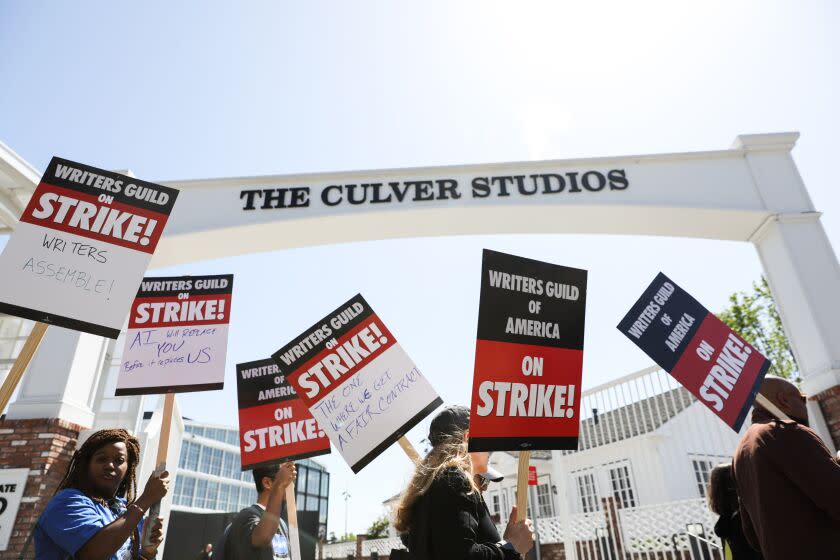What can WGA members actually work on during the writers' strike?

Unable to come to an agreement with the Alliance of Motion Picture and Television Producers on wage increases, benefits and other protections, the Writers Guild of America has called a strike — effectively halting productions across Hollywood.
The estimated 11,500 members of the union will stop working for production companies that include Walt Disney Co., Warner Bros., Netflix, Amazon and Apple.
But what does a work stoppage mean for writers? Does everyone need to put their pens down and store their keyboards?
Not exactly.
The basic rule from the WGA is that writers must immediately stop providing writing services for any and all companies that are part of the Alliance of Motion Picture and Television Producers.
If writers have covered projects in the works, they can’t continue working on them or complete them. In this scenario, the guild recommends that the writer save a digital date-stamped copy of all unproduced literary material in a writer's possession within 24 hours of the commencement of the strike. This will protect the writer in the event a strike-breaking allegation is made against them.
The Times reviewed the guild’s strike rules to help provide clarity on what writers can and can’t do during the strike.
Meetings and deals writers can't do
The strike prevents writers, their agents or other representatives from having meetings or engaging in conversations with production companies regarding present or future projects.
A writer "can't start talking to a top producer about the sort of work they do," said Jonathan Handel, a Los Angeles-based entertainment lawyer.
"You can't have any job-related conversations, basically, even in a social setting."
Respecting the picket lines doesn't just mean not walking into physical buildings; it also means you're prohibited from attending writing rooms remotely.
The guild further specifies that writers cannot attend pitch meetings or communicate with a company representative to receive notes on literary material, even if the writer intends to wait until the strike ends to work on the provided notes.
Also prohibited: signing, delivering or submitting any literary material (writing samples) including scripts, outlines or treatments.
In regard to negotiating a deal or employment on writing services, if the deal was completed before the strike or the effective date of the deal is intended to be deferred until after the settlement of the strike, a writer cannot sign or deliver a contract, certificate of authorship or other transactional documents.
Writers can accept payment for writing services performed before the strike.
Writers can't work on these projects
Writers cannot provide writing services for a production company in connection with audiovisual or audio works intended for movies, TV and new media.
Writers who are interested in providing writing services for fiction podcasts or fully animated theatrical features and television programs are advised to consult with Writers Guild of America staff to determine whether such work is prohibited, the guild said.
Projects combining live action and animation are generally covered by the strike.
What about non-union writing projects?
No, a writer cannot write for a non-union project.
Handel said that regardless of whether there's a strike, a member of the Writers Guild of America cannot provide services for a non-union project.
"Because of working rule eight, [it] does not allow members to work for non-union projects," he said.
According to the writers' guild, this rule applies to non-signatory foreign producers as well.
What are hyphenates prohibited from doing?
Writers who have dual positions — for example, writer-directors or writer-producers — are called hyphenates. Hyphenates are prohibited from performing or providing any writing services during the strike.
The guild's list of work a hyphenate cannot do includes the following:
Cutting for time.
Bridging material necessitated by cutting for time.
Changes in technical or stage directions.
Assignment of lines to other existing characters occasioned by cast changes.
Changes necessary to obtain continuity acceptance or legal clearance.
Casual minor adjustments in dialogue or narration made prior to or during the period of principal photography.
Changes in the course of production.
Instructions, directions or suggestions that are made verbally or in writing, regarding a story or screenplay.
What can writers work on?
Writers can still work on spec scripts (a project that isn’t being shopped around, and the writer isn’t engaging with a production company for the purchase of it), Handel said.
And, for writers with a lot of time on their hands, he added, writing that isn't covered by the writers' guild includes work on books (fiction and nonfiction), magazines, other articles, graphic novels and poetry.
This story originally appeared in Los Angeles Times.

